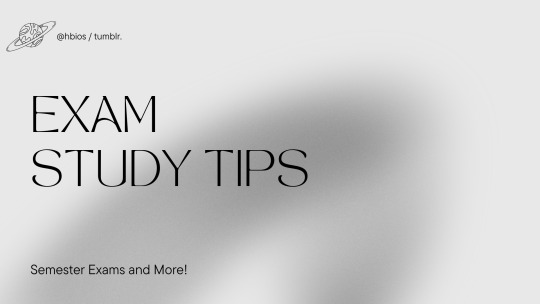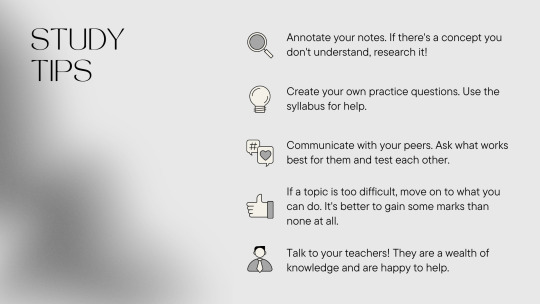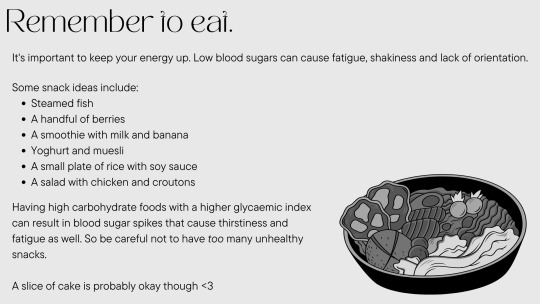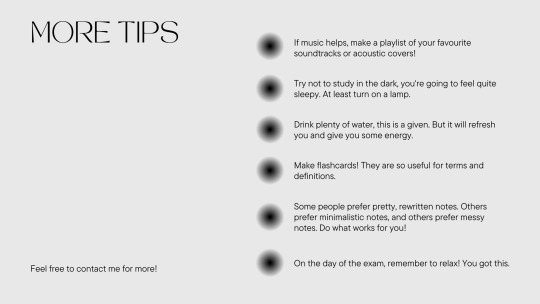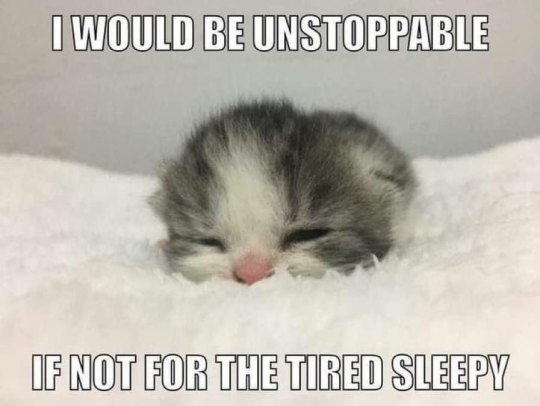Text
some of my favorites masterposts!
they are not mine by the way.
sorry for any grammar mistakes. English it’s not my mother language

Study Tips:
time to study
guide to aesthetically pleasing notes
tips to stay focused and productive
guide to effective slides
revision
studying with depression
WORK FROM HOME ROUTINE FOR PRODUCTIVITY
The ABCDE Method: Accomplish Tasks more Efficiently
how to survive online school
How to remain productive with online classe
Tumblr Resources to Get You Through the School Year!
some free books and essays and things in no particular order:
study break ideas
how i use google drive for university
Playlists:
playlists to pass the time
more playlists
study music playlist masterpost
ambient sounds and music
asmr ambiences to study/focus along
a playlist for….
Videos:
videos that make me want to study
Important TED talks
Studying MASTERPOST (Youtube Edition)
video game study music
I want to improve my drawing
Videos of thought
study videos
Dark Academia:
Sophie’s Dark Academia Rec List
YA books but make it dark academia
Dark academia things to study…
things i would want to see if The Secret History ever became a tv series
modern songs with dark academia vibes:
Do this is u are bored:
list of things to do when you are bored ( its amazing :) )
things to do on sundays to recharge and make the upcoming week awesome
Masterposts:
masterposts of anything
The Really Big Studying Masterpost
Productivity masterpost
Challenges:
About the 100 Days of Productivity Challenge
Self care:
how to: self discipline
things you will experience if you keep doing your best
10 Female Written Short Stories Everyone Should Read
99 legal sites to download literature
Read More, Read Better
Drink Magic Masterpost
Getting Stuff Done: How to Deal With Lack of Motivation
So. You want to garden.
Graphic design:
Here is a list of the active designblrs I found
Supply Recommendations for Graphic Design Students
beginner’s adobe illustrator pt 1
more graphic design tips
the fundamental elements of graphic design
Learning Italian:
resources for learning Latin
Short Italian Vocabulary Recap
Italian Masterpost
How I got a B2 in Italian in 1.5 years
Positive vibes Vocabulary
THIS WEBSITE
more Italian resourses
Learning Italian through YouTube
Italian words list (1) (2) (3)
free resources i use to learn italian
371 notes
·
View notes
Text
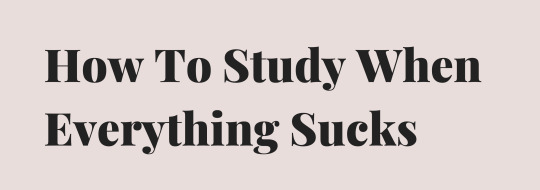
Hello, lovelies! I’ve gotten a couple of asks about studying so I decided to condense them into one post for you guys! I’m trying to hit a bunch of different topics so if you need an even more specific post you can send an ask! Without any further ado, have some tips! My studyblr is @spacey-scholar
Prep
First, you always need a good base for your day! Especially if you’re studying a lot.
Make a good full breakfast! Ex. Eggs and Toast, Smoothie and fruit, Pancakes and a cup of juice.
How’s your hygiene? Do you need to shower, brush your teeth, wash your face, condition your hair? Do it! You’ll be distracted if you feel messy!
Get dressed like it’s a normal day. Staying in PJ’s is okay! But being ready for the day seriously helps focus!
Likewise, your space should be clean. A clean space is a clean mind! Remove dishes, trash, scrap paper, and extra items. Wide down your desk, organize your pens and books. Your space should feel like your space!
Now make a list of what you need to get done! What needs to be done Now, what needs to be done Soon, and what needs to be done Later?
Order your list how you want your day to go, and don’t put super-tough subjects back to back, or subjects that are similar exercises i.e. reading thirty pages of two different books back to back is no fun.
The Studying
It’s important to buckle down with No Distractions! If you find yourself distracted put your phone away! If you need your phone, put it on Do Not Disturb until you’re done. I also do this at night for better sleep.
Pick the best technique for you, Pomodoro, reward-based, group studying, etc.
Play music but only if it will not distract you! If you sing along or daydream it’s the wrong music! Classical, Lo-fi, and White noise are all good! My Spotify Here has some good ones.
Use a nice journal (I don’t mean expensive!) and pens/pencils you enjoy using. I like to have a specific journal and color dedicated to each subject.
Take notes on recorded lectures and classes, if you’re doing online classes right now try to screen record or record the audio! That way if you space out you can play it later and take notes, and you can absorb the lesson better instead of being distracted.
Don’t worry about your notes, stationary, pictures, being beautiful and your grades being perfect. Life doesn’t always look the way it does on Instagram. And the people who spend hours trying to get a good photo of their coffee are not studying!
Use flashcards! Quizlet is good if you need premade ones! If you can save up and buy them, Barrons AP Flash Cards are the best in my opinion. Very clean, not too long, very durable, and cover all subjects.
Feeling Distracted
If you catch yourself drifting off and getting into your head, get up and take a quick walk, stretch, or energizer.
It’s okay if this happens, don’t guilt yourself! practice affirmation. The best and smartest still get distracted.
If you are drifting, why? Are you hungry? Tired? Thirsty? Bored? Get a snack and some water, take a break and rest, find a way to make your studying more enjoyable.
Remember that Motivation and Discipline are different things. Sometimes we just won’t be motivated, we won’t want to do it and it will be rather frustrating. But the cure to this is not shaming its discipline. Remind yourself “This may be hard, and I may not want to do this, but I want to reach my goals and If this is what It takes I will make it happen.
Always do just one more page of you’re tired. One at a time and oh you did it! Maybe just one more? One more? Eh, one more just to finish the train of thought, Oh just- I’m done? Nice!
If you really can’t focus just move on and come back to this subject, you can always ask for help.
Supplementary Things
There are so many apps you can use to study, for free! My favorites are Tide, Quizlet, Focus Keeper, Forest, Flora, Egenda, SpanishDict, Photomath, and Kahn Academy.
You can also join a study group! You may know one, but if you don’t, there are a lot of online ones! I’m in a study Discord and have been for a while! it helps a lot and motivates me to finish my work!
You can make a studyblr, but don’t do it just for the aesthetics! It’s about studying, and sometimes that gets messy! Sometimes we fail a test, we spill our tea on our notes, we cry because we don’t understand the formula. That’s the part you don’t see!
Having cute stationery can really help, as well as nice organizers and decorations for your space! I don’t have much money so I get a lot of stuff on Amazon or FB Marketplace.
Health
Remember that no matter what you are good enough. It’s okay if you fail, it’s okay if you struggle.
It’s also okay if your path doesn’t go the way you expected! Maybe you go to a different school than expected! Or choose a trade instead! Maybe you take a gap year! Maybe your passion changes! Maybe it changes six times!
Your health is always more important than your school. If you are in pain, mentally or physically, if you are anxious, exhausted, burnt out, talk to your teachers about it! You matter more than a grade.
Your best is good enough! And your best doesn’t look the same as someone else’s best! Don’t compare!
Now go get out there and study!
17K notes
·
View notes
Text
List of Seven Different Study Methods to Try Out:

Morning Routine Method:
If you struggle with procrastination, this method is for you. Make studying for thirty minutes apart of your morning routine, something you must do daily before you leave the house. Make it something that has to be done while you are getting prepared in the morning for the upcoming day, and something you can’t leave the house without doing like brushing your teeth.
Flash Cards:
Used to study multiple small bits of information in a short period of time, made in advance to squeeze in study time while waiting between classes or in lines. Recommended for biology, anatomy, equations for physics, learning new words in a different language, memorizing pharmaceuticals, medical roots and terminology, types of organic chemistry reactions, and multiplication tables.
Can be taped or pin around your home for constant recall of specific lines of information such as “the mitochondria is the power house of the cell” along with diagrams, so that bigger chucks of information sticks better from being constantly seen in places such as the front of the refrigerator, the door to your room, the bathroom mirror, and the wall in-front of your toilet.
Pomodoro Technique:
Work in 25 minute intervals separated by 5-10 minute breaks.
Used for long sit down sessions. Recommended for reading chapters of text books to prevent auto-pilot reading (where you look over a paragraph, but don’t really read it).
Also recommended for working on projects and assignments if one has trouble starting on work before the day it’s due, due to feeling like it’s to much work to do at once.
Treating Method:
Place a gummy-bear or other small piece of candy that won’t mess up your text book, at the end of each paragraph to create a bit more motivation to go on to read the next paragraph with the prospect of an immediate reward at the end.
Works best if you only allow yourself these treats for studying.
Combine with practicing actively recalling the information without looking at it, at the end of each paragraph, and treat yourself if you got the information mostly correct. If not, re-read and try again.

By MnMinSeptember on imgflip
Course/Test Cheat Sheet Page:
Make a page of the most important information you need to pass a test or class full of rules, equations, theorems, or definitions, and keep a copy at your desk, in your car, on your kitchen table, on the couch, and in your bag.
The key here is figuring out the most important information you need, and making sure that you can pick it up and study during any slow period during your day.
Thwart Method:
To retain information learned in a class, ~80% can be saved if reviewed within 24 hours, review for ten minutes the information a day later, and for five minutes the following two weeks, to be able to recall the information within five minutes while studying for the exam later.
The method is based on this “Curve of Forgetting” graph from California State University based on the study by Thwart-
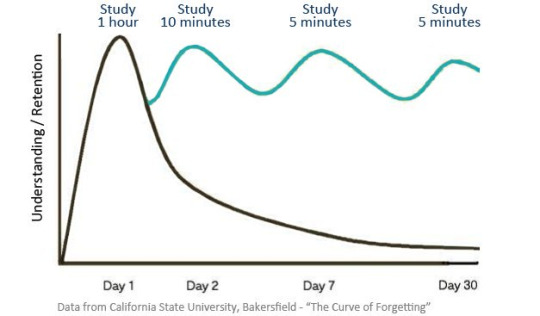
Teaching to Someone Else:
Put together a lesson plan to teach the information to someone else, make slides, write out your lecture and practice how you would explain it.
Tutor students a grade below or who are taking a class you already took, to retain the information better.
If you don’t want to teach the material to a friend who may also be in your class, and feel embarrassed to do it in front of somebody else, record yourself teaching the material and re-watch and edit it to make the video better. The video can be used to review the material later if you don’t want to re-read old notes.
90 notes
·
View notes
Text
My disability isn't an excuse. Its a genuine setback that I deal with every single day.
Stop comparing me to abled people. They will never have to work as hard as us.
I'm not annoying.
I'm not complaining.
I'm not lazy.
My body is struggling to survive and you expect me to be able to do what your nearly perfect body does?
The only thing here that is lazy and unmotivated is your ability to comprehend what the fuck a disability means.
4K notes
·
View notes
Text
advice from a friend in recovery
[part II: the depression edition]
since my last advice post is somehow still getting traction despite having been posted almost three years ago, i thought it might be a decent idea to expand it into a series! when i wrote that post i was dealing with the aftermath of traumatic events, experiencing a developing post traumatic stress disorder for the first time. what i needed most out of recovery was a way to build moments of solace and joy into my daily life, so that’s what that post focused on.
three years down the line, my recovery goals have changed quite a bit. my focus right now is on learning strategies to cope with major depressive episodes and figuring out how to pick up the pieces after days or weeks of barely being able to get out of bed. here’s what i’ve got down so far!
does waking up (and staying awake) in the morning feel like an insurmountable hurdle right now? same. it’s rough.
make your alarm impossible to ignore. turn the volume all the way up and set it to a song you can’t physically resist screaming along to (or a song you hate so much you would do literally anything to turn it off. either works). bonus points if you know you’ll have to sprint to turn it off before it wakes up others in your household.
you will feel worse if you turn the alarm off and crawl back into bed. trust me. you will. if you hit snooze, you’ll feel groggy and annoyed in ten minutes. if you turn the alarm off entirely, you’ll wake up in five hours and still feel like shit anyways.
make it as hard as possible for yourself to get back into bed. keep your alarm across the room from your bed, behind an obstacle course. the more things you’ve had to do before you can turn the alarm off, the easier it will be to just get up instead of going back to sleep.
if you can, use an app like this that sets your alarm to only turn off when you scan a certain barcode. set the barcode to something you keep on the complete opposite side of your house.
better yet, set the barcode to your tube of toothpaste. by the time you’re able to turn your alarm off, you’ll already be in the bathroom holding the toothpaste. while you’re still on half-asleep autopilot, it’s much easier to say “fuck it” and brush your teeth before you can think twice.
having a hard time with personal hygiene, but your own body odor is making you feel a thousand times more depressed? yeah, i’ve been there.
get yourself some really strong deodorizing soap. drag yourself into the shower, spend ten seconds lathering the parts of your body that smell the worst (armpits, groin, anywhere you sweat a lot). rinse and repeat twice. the smell will be completely gone with minimal effort on your part.
don’t have the energy to shampoo, but greasy hair also making you feel gross? just use the bar soap on your hair too. yes it will dry your hair out, but it’s effective and you can always condition later if you feel better.
don’t have the energy to get into the shower or turn it on? if your pits are sweaty, just take the bar of soap and rub it in the sweat until it lathers. wipe off the soap residue. it will smell a thousand times better. (if your pits are not sweaty enough for this, a splash of water works great too).
your bedroom is such a mess that you can’t even imagine how you could start cleaning it? i know the feeling.
pick a corner. designate this your “clean corner.” literally shove the clutter away from this corner until you have a space big enough to sit down in. cleaning is less overwhelming when you have somewhere to retreat to.
personally, the bulk of my mess is usually dirty laundry that i have been putting off washing. forget about washing it right now. if you have a separate closet, pick up every piece of laundry on the floor and throw it into that closet to be dealt with later. close the door.
if you don’t have a separate closet, stuffing it into trash bags is another way to collect your dirty laundry and make it less visually overwhelming. trash bags can be stacked better than individual items of clothing, leaving you with more empty floor space.
the next easiest thing to get rid of is trash. if there’s so much trash around that picking up all of it at once is daunting, start with food waste. it is easy to identify and probably making your room smell.
out of sight, out of mind. the more you can shove the clutter into boxes, bags, closets, etc. to deal with later, the better. you can sort through it, pile by pile, when you have the time.
you don’t have to be perfect all of the time. or any of the time, even!
depression making it impossible for you to do the dishes? if you’re able to stock up on paper plates, cups, and disposable utensils, just use those instead. i promise, you are not singlehandedly destroying the environment by doing so.
out of clean clothing, but can’t muster up the energy to do laundry? spray your clothes with febreeze. wait a minute and then shake them out as hard as you can to air them out. congrats, you now have a single outfit that smells more like car air fresheners than body odor. (please do not do this with underwear. if you need to reuse underwear, turn it inside out).
cheat on your assignments. for fuck’s sake, if it won’t get you in trouble, just do it. academia is a sham, you have more important things to worry about, and you can always learn the information later when you’re not working against a deadline.
know that sometimes it is all you can do to stay alive. every breath you take is an accomplishment. on the days when you can’t even stand up, rolling over to the cooler side of the pillow is an accomplishment.
you are quite literally winning at life, by sheer virtue of not being dead right now. congratulations!
i’m proud of you.
464 notes
·
View notes
Text
UNIVERSITY WITH MENTAL ILLNESS
Mental health and illness is already hard enough, but adding school pressure on top is hard. High school was easier for me since there is a lot more structure and a lot less choice, which is why I'm targeting this towards college and university students.
Firstly is attending class. Getting to class is a major hurdle, especially with a commute like me (1 hour+) broke people problems lmao. Driving that long to go to a class just to drive back home is already exhausting and unpleasant, especially knowing professors will post slides or something after class anyways. But you have to drag yourself there. One thing I do to help is dress up. I'll do my makeup and put on nicer clothes. Why does this work for me? I hate wasting stuff, especially money and to me, putting on makeup is spending money essentially (same logic as using rare items in a video game idk). I can't just sit around the house and waste the money I just put on my face so I gotta go to class. Small things like this to trick your brain works so well. Before this, there was a restaurant I absolutely loved next to campus so if I went to every class for two weeks I would reward myself by going there. Another thing that helps is making plans with people ahead of time. They'll hold you accountable on days that you can't.
Take rest days. Schedule one whole day a week where you don't do school or go to work. It's a day completely off for anything. I use this day to do chores in the morning and then just lay around and do absolutely nothing all afternoon and night. This helps recharge and reduce stimulation and socialization. It gives your brain that little rest it cries for every day. I used to panic so much about this one day because I could be working and making money or studying or doing anything to be productive until I had a week where I couldn't do anything because I broke down completely, mentally and physically. Now I see it as a preservation day. I use this day to recover from everything.
Make your notes pretty. I hate going back and looking at my messy class notes. Everything is scattered and messy and I get frustrated. What I do instead is make a virtual, concise copy that is pretty to me. I'll add little sketches, color, pictures, etc. This helps draw my attention and allows me to study while doing it! Making the second copy forces you to go through the material after a class is over and review the material to decide what is truly important and then organize it all and then rewrite it all. This has been a huge help.
Use class breaks to snack or grab coffee. One thing I have found in many people with high anxiety is that food and drinks really help calm you down. I've found some research suggesting it's because food is a signal that things are safe and therefore makes you more relaxed, though I don't know much about anthropology and psychology fields. I find this really helps to calm me down after I had a very stressful test so that I can be more present for the next class. Gum helps a lot on high anxiety/panic days as well.
Download the notes or slides, especially if posted ahead of time. This way you have access even if you don't have wifi. You can even pull them up in lectures so you don't have to focus on the board the whole time. For my people with autism, this has helped me so much. There are times where you can't focus on the professor and the slides and the sounds and writing, so doing this cuts out having to watch the teacher and the board. Bonus points if you can record during lecture as well so you can revisit parts that you zoned out in or couldn't focus on.
Keep a journal or diary and list your activities, food, weather, etc in it as well as your mood. This can help you find correlations to hack shit. My favorite way of doing this is through the Daylio app (I wrote a post about it here). Like I notice that days when it's rainy, I study and read more and days where I walk more and eat breakfast, I focus better and am happier overall. This information helps so much. If I know it's going to rain tomorrow, I won't try to force myself to study a bunch today and instead save that energy for later. Instead, I'll take care of myself and go for a walk or something. Knowing how you work and why really makes a HUGE difference.
This might just be my autism brain, but finding cool things related to the topic at hand has helped me keep interest in at least a little of the subject, helping me study more. Like I don't like chimaeras (a fish group) BUT for some reason I love fish teeth and these fishes have a very unique tooth set. This at least let's me know something instead of just ignoring and forgetting everything. 20% is better than nothing.
Find a reason to study what you do, even if it's just that you need this class to graduate. Just taking classes for no reason seems like something neurotypical people are able to do. I can't do it. I need a reason and if I can't find one, I just give up. I used to always say it was useless and pointless and didn't understand why it was required. But I realized the reason to take it is because I want a piece of paper that says I traded lots of money and sanity for it. And that reason has to be good enough.
Make study games. Games are more fun than lifeless paper. Matching games, crosswords, coloring pages, whatever you like!
Feel free to add your tips to this post as well!! I always have room for improvement and experimentation, especially for really hard days. I still find myself skipping even online classes some days. No one had all the answers or has everything figured out. This is just an incomplete list of things that have helped me out a bit and made college life a bit easier.
2K notes
·
View notes
Text
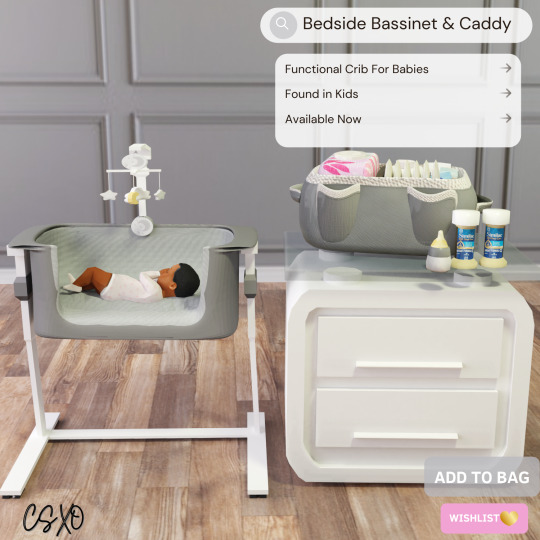

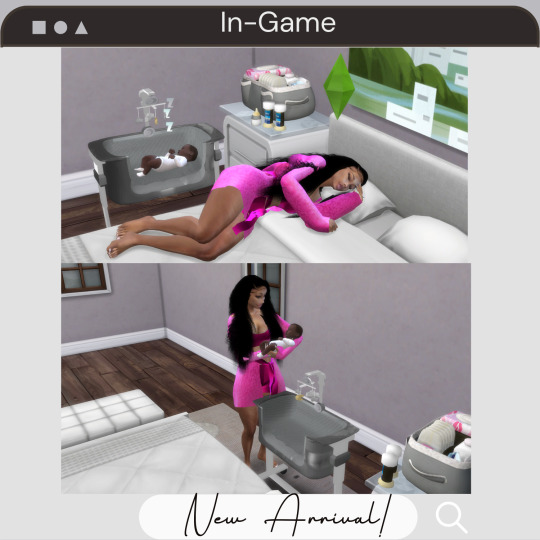
Bedside Bassinet & Caddy 🍼
Details & Download Here
2K notes
·
View notes
Link
As a teenager, Sylvia Plath vividly understood the extent to which her body steered her. “If I didn’t have sex organs, I wouldn’t waver on the brink of nervous emotion and tears all the time,” she wrote in her journal in 1950. Ten days before her death, she had come to believe that “fixed stars/Govern a life.” It turns out that Plath was probably right – more right than she could have possibly known – about her biology and her fate. But when Plath’s journals were first published in 1982, what was most obvious about her was the supercharged nature of her emotions. Whatever causal agents may have been governing Plath’s life, they were blown back by the force of her personality.
As unmistakable as were Plath’s volatile emotions in the 1982 journals, the heavy editing of the text necessarily made it hard to discern the patterns to her moods. Even so, there did seem to be a detectable pattern, and it did not seem then, nor had it seemed to the people closest to her during the last years of her life, to be merely a function of temperament. In the weeks before her suicide, Plath’s physician, John Horder, noted that Plath was not simply deeply depressed, but that her condition extended beyond the boundaries of a psychological explanation.
In a letter years later to Plath biographer Linda Wagner-Martin, Horder stated: “I believe … she was liable to large swings of mood, but so excessive that a doctor inevitably thinks in terms of brain chemistry. This does not reduce the concurrent importance of marriage break-up or of exhaustion after a period of unusual artistic activity or from recent infectious illness or from the difficulties of being a responsible, practical mother. The full explanation has to take all these factors into account and more. But the irrational compulsion to end it makes me think that the body was governing the mind.”
For at least the past 10 years it has been generally assumed that Plath fit the schema of manic-depressive illness, with alternating periods of depression and more productive and elated episodes.
The hypothesis that Plath suffered from a bipolar disorder is persuasive. But in late 1990, another, even more intriguing medical theory emerged. Using the evidence of Plath’s letters, poems, biographies and the 1982 journals, a graduate student named Catherine Thompson proposed that Plath had suffered from a severe case of premenstrual syndrome. In “Dawn Poems in Blood: Sylvia Plath and PMS,” which appeared in the literary magazine Triquarterly, Thompson theorized that Plath’s mood volatility, depressions, many chronic ailments and ultimately her suicide were traceable to the poet’s menstrual cycles and the hormonal disruptions caused by PMS.
Thompson pointed out that Plath unwittingly recorded experiencing on a cyclical basis all of the major symptoms of PMS, as well as many others, including low impulse control, extreme anger, unexplained crying and hypersensitivity. She also suffered many of the physical symptoms associated with PMS, notably extreme fatigue, insomnia and hypersomnia, extreme changes in appetite, itchiness, conjunctivitis, ringing in the ears, feelings of suffocation, headaches, heart palpitations and the exacerbation of chronic conditions such as her famous sinus infections.
Thompson compared Plath’s reported mood and health changes with the journals, letters and biographies and found that her symptoms seemed to appear and disappear abruptly on a fairly regular schedule, with clusters of physical symptoms and depressive affect followed by dramatic changes in outlook and overall physical health. Those patterns can be directly linked to the dates of Plath’s actual menses, particularly in 1958 and 1959, when she most habitually noted her cycles. Judging from the pattern of Plath’s depression and health in late 1952 and in 1953 until her Aug. 24 suicide attempt, Thompson posited that “it seems reasonable to conclude that this suicide attempt was directly precipitated by hormonal disruption during the late luteal phase of her menstrual cycle and secondarily by her loss of self-esteem at being unable to control her depression.”
Thompson showed that a well-known journal entry from Feb. 20, 1956, is clearly traceable to Plath’s menses, to which she refers directly a few days later. The journal fragment takes on new meaning in light of having been written during the physically and emotionally debilitating luteal phase of Plath’s cycle: “Dear Doctor: I am feeling very sick. I have a heart in my stomach which throbs and mocks. Suddenly the simple rituals of the day balk like a stubborn horse. It gets impossible to look people in the eye: corruption may break out again? Who knows. Small talk becomes desperate. Hostility grows, too. That dangerous, deadly venom which comes from a sick heart. Sick mind, too.” On Feb. 24, the same day she notes in her journal that she has a sinus cold and “atop of this, through the hellish sleepless night of feverish sniffling and tossing, the macabre cramps of my period (curse, yes) and the wet, messy spurt of blood,” Plath wrote a letter to her mother blaming her dark mood on her physical health: “I am so sick of having a cold every month; like this time, it generally combines with my period.”
By the fall of 1962, the poems (which Plath carefully dated as they were completed) seem to follow a pattern of metaphorical renewals and optimistic transformations for roughly two to three weeks of artistic production, then jagged, seething accusations and aggression for a couple of weeks.
Thompson’s PMS theory has been largely ignored by Plath scholars. But it immediately gained two important supporters: Anne Stevenson, Plath’s controversial biographer, and Olwyn Hughes, Plath’s former sister-in-law, whose letters were published in a subsequent issue of Triquarterly. Though oddly defensive in tone, Stevenson’s letter does commend Thompson for her “invaluable contribution to Plath scholarship … Certainly no future study of Plath will be able to ignore the probable effects of premenstrual syndrome on her imagination and behavior.” And it states that she wishes she had been able to utilize Thompson’s insights in the writing of her own work on Plath.
A letter from Olwyn Hughes also congratulates Thompson for her scholarship, but unlike Stevenson, Hughes practically stumbles over herself in amazement at the PMS theory. Hughes, who was quoted in Janet Malcolm’s book “The Silent Woman: Sylvia Plath and Ted Hughes” as characterizing her long-dead sister-in-law as “pretty straight poison,” wrote to Thompson: “It is quite a shock to digest all this – after thinking for so long that Sylvia’s subconscious mind was her prison, and to suddenly realise it may well have been in part, or wholly, her body. But it certainly tallies with Ted’s mentions – he has always felt some chemical imbalance was involved.”
Hughes further points out that Ted Hughes had spoken of Plath’s ravenous appetite just prior to her periods and asks, “I wonder if that is a known characteristic of PMS?” (According to the PMS literature, it is.) But most tellingly, Olwyn Hughes explains that “one of the reasons I was so bowled over by your piece is that Sylvia’s daughter, very like her physically, suffers quite badly from PMS but is, in these enlightened times, aware of it and treats it.”
Dr. Glenn Bair, one of the leading experts on PMS treatment and research in the United States, confirmed to Salon that PMS is typically passed from mother to daughter. In a rare interview about her parents, Frieda Hughes told the Manchester Guardian in 1997 that after the “collapse of her health,” including extreme fatigue and gynecological problems, she underwent a hysterectomy in her 30s.
After a careful review of Thompson’s article, of a seven-page monthly breakdown of Plath’s symptoms for 1958 through 1959 and of the documented evidence of Plath’s pregnancies and postpartum symptoms of 1959 through 1962, Bair said, “If you hack through the PMDD criteria, I think that you’ll find that she fits the PMDD profile.”
168 notes
·
View notes
Photo


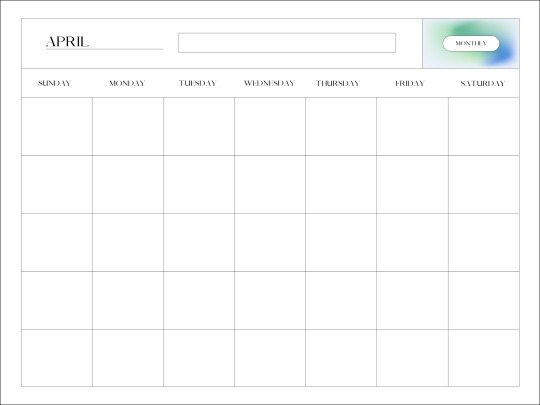
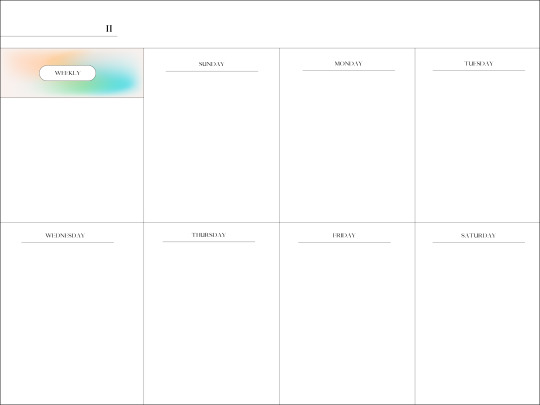
✳︎ 2022 DIGITAL PLANNER ✳︎
✧ 12 month calendar ✧ monthly planner ✧ weekly planner
♡⃣ 77-page, printable pdf file
♡⃣ vector graphics, shapes, and lines
♡⃣ horizontal 𓏔 1366 × 1024 px, ipad screen size
free download here.
do not take out/repost without permission
196 notes
·
View notes
Text
College WordBank!
There are a lot of words that may seem new and weird throughout college applications, so here is a list of words that I defined in order to help you glide through the application process!
The Basics: Treat Yo Self! (and know the facts!)
1. Undergraduate: An undergraduate student is someone who is obtaining an undergraduate education or degree, such as a Bachelor’s degree.
2. Private University: A Private University is a college that is privately funded. They tend to be smaller than public universities as well.
3. Public University: A Public University is a college that is publicly funded, specifically through the national government. They tend to be larger than private universities.
4. Safety School: When applying to colleges, a safety school is a college where the stats of a typical student admitted is lower than your stats, which indicates that it may be easier for you to get in (since you have higher stats than the average).
5. Target School: A target school is a college where the stats of a typical student admitted is similar to your stats, which indicates that you are the same level as other applicants.
6. Reach School: A reach school is a college where the stats of a typical student admitted is higher than your stats, indicating that it is a more competitive college.
7. College Confidential: A website full of threads and information about college admissions. Although some of the pages found on College Confidential are helpful, there are some things found on this site that may discourage you for no apparent reason, such as “Chance Me” threads. Therefore, I advise you to steer clear of College Confidential and, by all means, do not let it get to your head!
8. “Chance Me’s”: “Chance Me” are threads found online where people write their stats and ask for others to see if they can get accepted to a specific college. I advise you NOT to trust these things, as people online do not know your chances of getting into a specific school.
9. Common App: Also known as the Common Application, the Common App is an application used for undergraduate admissions to a multitude of colleges. A majority of colleges accept the Common App, but I suggest looking in on the ones you want to apply to in order to know for sure.
10. Universal College Application: Similar to the Common App, the Universal College Application is also a site used by many people to send their college applications.
11. SAT II’s: Also known as SAT Subject Tests, the SAT II’s are exams that are taken in specific subject areas, such as Biology, Math I/II, and US History. Many colleges do not require SAT Subject Tests. However, it is important to check and see if some colleges require you to take an SAT Subject Test, or if it is optional. Although it may be optional for the college, it is still your decision if you would like to take this exam or not for admission purposes.
12. Transcript: A report of all the grades you have received in each class that you have taken during high school. Colleges require an official transcript to be sent to the admissions office.
13. Recommendation Letter: A letter that details why you are an excellent fit in said college. These letters usually come from teachers, faculty, coaches, mentors, etc. Recommendation letters should NOT be written by a family member.
14. Personal Statement: A Personal Statement is basically a college essay. Many colleges require you to write at least one, while others require more than one essay.
15. Need Blind Admissions: Need-Blind Admissions is when colleges will decide on your admissions decision without looking at your financial information. To clarify, this means that the college will decide on your admissions decision solely on your application and not on your financial information.
16. Waitlisted: Waitlisted is sort of the middle ground for colleges. When you are waitlisted, it does not mean that you are accepted or rejected. Instead, it means that you are put on a “waiting list” and, if the colleges enrollment numbers from their accepted students are lower than expected, they will accept more people from the waitlist.
17. Deferred: Deferred is when a college pushes your application to the next filing period. This means that you have not been accepted or rejected yet. Instead, the college has pushed your application in order to review it again and make a final decision. A deferral only happens if you have applied Early Action or Early Decision.
18. Legacy (Applicant): A legacy applicant is someone who is applying to a college that a family member has went to, usually their parents.
Types of Applications (it’s “ED” as one, two, three! Get it!?)
1. ED/Early Decision: A type of application filing period where you are able to apply early, but it is binding. This means that if you are accepted to said college under Early Decision, you are required to go there upon acceptance. Usually, the application deadline is in November and admission decisions are in Mid-December. Something to note about this is that you can apply to only one school with an “Early Decision” (since it is binding), but you can apply to other schools with a different filing period, such as Early Action and Regular Decision.
2. EA/Early Action: A type of application filing period where you are able to apply early, but it is not binding. This means that you are applying earlier than the normal application period and you will NOT be required to go to said college upon acceptance. Similar to ED, Early Action’s deadline is around November, but the admissions decision’s date varies. Unlike the Early Decision, you can apply to as many Early Action’s as you want (unless Single Choice Early Action, more on that below)
3. Single Choice/Restrictive Early Action: This is a type of application filing period where you are only allowed to apply to one Early Action school. However, this means that Single Choice/Restrictive Early Action is still non-binding (not required to go upon acceptance), but you can only apply to one school under Early Action. Similar to ED, you are able to apply to colleges under other types of filing periods, such as Regular Decision.
4. RD/Regular Decision: This is the normal time when applications are due. Regular Decision is the time when most people apply to colleges. The applications are usually due in January and results typically come out in March (although, it may vary depending on the college). Regular Decisions are non-binding and you can apply to as many as you want.
5. Rolling Admissions: This is a type of application filing period when you apply to a college and the college admissions office reviews them as they receive the applications. Unlike ED/EA/RD, Rolling Admissions does not have a set date where you can go and look for your college admissions decision. Typically, the college will give you a time frame in which they will give you your admission decision, which is possibly around 2-8 weeks depending on the college. Something to note is that a lot of colleges with Rolling Admissions may not have a distinct deadline for the application, but they will have a “priority deadline” where, if you submit your application before that date, then they will get back to you sooner. Overall, the earlier you submit your application for Rolling Admissions, the quicker you will know your decision.
6. Open Admission: This is a type of application filing where colleges accept all students, as long as they have completed high school or have a GED.
Financial Aid: Dolla Dolla Bills Y'All!
1. Grant: A grant is money that you receive in your financial aid packet that you will NOT have to pay back.
2. Loan: A loan is money that you receive in your financial aid packet and, if you accept, will have to pay back.
3. Scholarships: A scholarship is money earned due to certain achievements, such as academic, athletic, etc. Similar to a grant, it is money given to you that you do not need to pay back. However, for a scholarship, it may be awarded by the college or awarded separately by applying for one.
4. FAFSA: Also known as the “Free Application for Federal Student Aid”, the FAFSA is a website that most colleges will advise you to use in order to receive financial aid from colleges. The FAFSA application will ask for information on your household’s tax forms in order to determine how much grant and loan money you may receive. The FAFSA application opens on January 1st of every year, but deadlines for completing the application varies for every college. Something to note is that you will need to apply for Financial Aid every year in order to receive aid while you are in college.
5. CSS Profile: Also known as the “College Scholarship Service Profile”, the CSS Profile is found on the College Board website where you apply in order to receive more financial aid. Many colleges require the CSS Profile (and sometimes early on), so I advise you to see if it is required.
6. Expected Family Contribution (EFC): This is a number found on your FAFSA that provides an estimate of the amount of money your family will be expected to pay for your education. To note, this estimate is the amount of money you will be expected to pay after financial aid is accounted for.
7. Institutional Grant: An institutional grant is money given by the college that you do not have to pay back. This is different compared to the federal grant, since the federal grant is provided by the government instead of the college itself.
8. Merit-Based Grants: These are grants that are made due to academic achievement.
9. Need-Based Grants: These grants are given to students due to their level of income.
10. Federal Pell Grant: This grant is money that the federal government gives you that you will NOT pay back.
11. Institutional Loans: An institutional loan is money given by the college that you have to pay back. This is different than the federal loans, since the federal loans are provided by the government instead of the college itself.
12. Direct Subsidized Loan: A loan is money that you receive in your financial aid packet and, if you accept, will have to pay back to the college. The Direct Subsidized Loan is a federal loan that pays the loan’s interest while you are in college. However, once your undergraduate education is completed, you will be required to start paying the Direct Subsidized Loan (Note: this loan allows a six month grace period before you starting paying).
13. Direct Unsubsidized Loan: A loan is money that you receive in your financial aid packet and, if you accept, will have to pay back to the college. The Direct Unsubsidized Loan is a federal loan that does not pay the loan’s interest while you are in college. This means that, as you continue through college, you are responsible for paying the loan’s interest. However, if you decide you don’t want to pay the loan’s interest while in college, then the interest will be added to the principal (or the original loan’s amount).
14. Perkins Loan: The Perkins Loan is given to students depending on their school, as some schools do not participate in the Perkins Loan. Similar to all loans, it is money borrowed now that must be paid back later. However, unlike the other loans stated here, this loan is a college issued loan instead of a federal loan, meaning that the money is paid back to the college not the government.
15. (Parent) PLUS Loan: A PLUS Loan is a loan taken out on the parents name for an undergraduate student. This means that parents with undergraduate students may use this money for college expenses. PLUS Loans are to be paid back to the federal government.
16. Work Study Program: The Work Study Program is one in which a student may hold a job on campus while earning their degree/education. You can apply for the Work Study Program through the FAFSA application. The money you earn from this job can be used on anything, from tuition to food, etc.
You’re In College! Now what… (Everything you need to know while in college)
1. Major: A specific area that an undergraduate student focuses on during college. The student must follow and complete the courses stated in their specified major in order to receive their degree.
2. Minor: Although it is not required, some undergraduate students choose a minor in order to have a secondary focus. If you choose to minor, you do not receive another degree. Instead, minoring in something during college is solely for your own personal interest and to expand your knowledge.
3. Double Major: When you double major in something it means that you are following two specified areas. Double Majors receive two degrees for the areas in which they studied.
4. Undeclared: To be undeclared in college is to not choose a major/degree. Many people go into college undeclared, while some are even undeclared up until their second year of college. However, depending on your college, there may be a specific time or deadline to declare a major, since you will eventually be required to have one in order to obtain a degree.
5. Placement Test: A placement test is a preliminary test in order to see what level you are in specific subjects. These are normally taken when you have selected a college to attend (as an entering college freshman) and must register for classes. Also, something to note, all colleges do not have placement tests.
6. Bursar Office: The Bursar Office is the branch of the college that takes care of payments and billing statements for the student.
7. Financial Aid Office: The Financial Aid Office is the branch of the college that takes care of the financial aid aspect for the student, such as determining grant money.
8. Registrar: The Registrar Office is where they handle student records and scheduling for the college.
9. Commuting/Commuter: A commuter is a student who travels to college from where they reside. This is a longer distance than the typical five minutes off campus.
10. Transfer Student: A transfer student is someone who is changing from one college to another. Most people who change colleges decide once they know that their credits will transfer to the next college.
1K notes
·
View notes
Photo
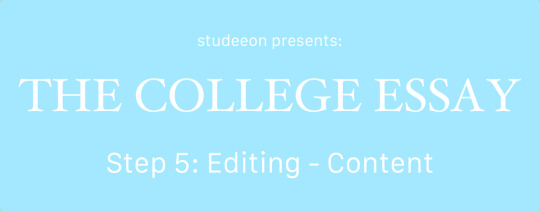
Hello! As a college student and a tutor for writing college essays, I figured some good first content would be a college essay writing guide (especially since it’s right in that season). This guide is tailored towards American universities, as that is what I have experience with. I have six steps that I guide my tutees through in their essays that I will put into six posts. Please reach out with any questions and let me know if this is helpful!
Step 1: Reading/Picking a Prompt
Step 2: Picking Your Response
Step 3: Outlining Your Essay
Step 4: Writing
Keep reading
34 notes
·
View notes
Photo
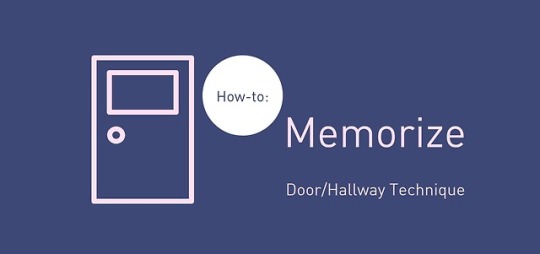
Here is the thing about Memorizing: Some people are naturally really good at it and others have to work harder.
When I was younger, I was the first one. I memorized all of my music for band and passages of books for presentations.
When I got to university and was asked to memorize long strings of dates and events, my professor introduced us to the “Door/Hallway technique”. If anyone watches Sherlock, this is similar to the memory/mind palace technique, or the roman room method.
The first step is to close your eyes and imagine you’re in a hallway with a row of doors. For me, I imagine the hallway where I live in my university residence, which is a row of orange doors.
Now imagine you open up the first door. For this example let’s say you are trying to remember everything that happened last month first: you might visualize a calendar showing February. If you had a test, you might visualize your materials spread out on a desk. If there was a family member’s birthday, you might show a cake with their name on it.
The last step is to continue doing this. That’s it. Add as many rooms as you need. I used this method to memorize the entire canon of art history for a test, from 35 000 BCE to Byzantine Rome. By creating rooms for each period, I was able to visualize what was happening at the same time: it allows me to connect what happens in the Mediterranean to what’s happening in Europe to what’s happening in North Africa. It allowed me to memorize and visualize thousands of years of art and situate them in relation to each other the way a timeline just couldn’t.
I thought I would talk about this because it is almost exam season and it might be helpful for everyone who is trying to review and memorize! Good luck everyone!
1K notes
·
View notes
Note
Do you have a post on how to get ready/study for the SAT/ACT?
Hi! I haven’t got any tips personally since I haven’t done them myself. Here are some resources to read:
no-study SAT tips
the new SAT
how to study for the SAT effectively
how to achieve the SAT score you want
free SAT and ACT prep materials
SAT and ACT resources
things the SAT prep books won’t tell you
Hope this helps x
209 notes
·
View notes
Note
Going off of a previous ask, any more sat or act prep blogs?
Hey! I’ll link you to blogs and posts.
How to self study for the SAT
Last minute SAT prep tips
Guide to SAT prep
SAT post
SAT prep group (inactive, but still useful)
Prep for SAT (inactive, still useful)
Words
Useful things
This blog is great
SAT review posts
ACT prep blog (inactive)
Surviving the ACT
SAT/ACT tips
SAT & ACT practice tests
ACT prep blog
2K notes
·
View notes
Video
youtube
Hello, lovelies! This week, I talk about how I got a 2300+ on the SAT without any outside tutoring or prep classes. Yes, it’s possible, and I tell you how to do it in the video.
I also put together a masterpost of resources below. Even if you aren’t self-studying, a lot of these things might be helpful:
PREP BOOKS
Official College Board SAT Study Guide (The Blue Book)
Direct Hits Vocabulary (Volume 1) // Direct Hits Vocabulary (Volume 2) – What makes these books stand out from other SAT vocab books is the use of pop culture references to explain definitions. For example, the first word in Volume 1, ambivalent, is given the sentence: “In The Avengers, Tony Stark, Steve Rogers, Bruce Banner, and Thor are initially ambivalent about joining S.H.I.E.L.D.’s Avengers Initiative.”
Barrons SAT 2400 – Fabulous book, helpful strategies. I didn’t read the whole thing or do all the practice problems; I only used it for extra help on the sections I struggled with.
Grubers SAT 2400 – Didn’t personally use it myself, but it was recommended by a lot of my friends.
CRITICAL READING
→ Non-SAT Critical Reading Advice
→ My favorite reading sources:
The Atlantic – mix of interesting articles
Variety – pop culture focus, but with more cultured language
New Yorker – very cultured, good place to pick up vocabulary
New York Times – classic SAT reading material
Boston Globe – I have a soft spot in my heart for their entertainment and style sections
National Geographic – exactly the sort of passages you’ll find on the SAT
→ Vocab Flashcards (mentioned in video)
WRITING
→ Top Writing Errors
→ Top Grammar Rules
MATHEMATICS
→ Khan Academy
3K notes
·
View notes
